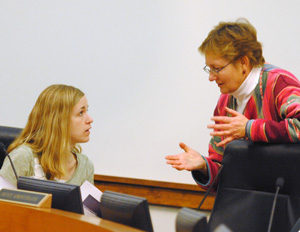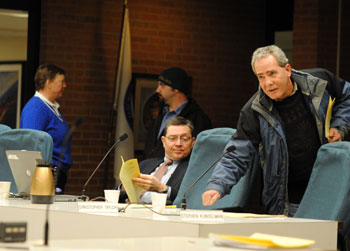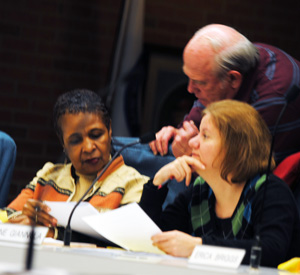Packard near Platt crazy slick. Be careful!
Archive for December, 2010
UM: Mark Pescovitz
The Indianapolis Business Journal reports that Mark Pescovitz – a surgeon at the Indiana University School of Medicine in Indianapolis and the husband of Ora Hirsch Pescovitz, who leads the University of Michigan Health System – died in a car accident on Sunday outside of Ann Arbor. On her website, Ora Pescovitz posted a statement, which reads in part: “This unexpected tragedy reminds us all of the fragility of life, and I am grateful for the support and well-wishes that my family and I are receiving from the U-M and Ann Arbor communities, as well as from our wonderful friends and family in Indianapolis.” [Source]
Fountain & Cherry
UPS truck stuck on icy street, spinning wheels trying to go north (up the hill) on Fountain Street.
Washtenaw, What’s Your Farmer Grow?
Ann Arbor greenbelt advisory commission meeting (Dec. 8, 2010): Here’s one thing that greenbelt commissioners learned at their Wednesday meeting: Washtenaw County contains 166,881 acres of farmland, yet the county ranks low on an index that gauges an area’s ability to produce enough food to meet the needs of local residents.

Greenbelt advisory commission chair Jennifer S. Hall, left, talks with Peg Kohring of The Conservation Fund prior to GAC's Dec. 8 meeting. (Photos by the writer.)
Staff gave an overview of agricultural production statewide and in Washtenaw County, with the goal of providing some context as commissioners consider how to support local farmland within the greenbelt. It’s an issue that’s emerged frequently at previous GAC meetings, and one that the commission’s chair, Jennifer S. Hall, said they’ll be continuing to address in the coming months.
Farmland also played a role in reaching a milestone announced later in the meeting: With the recent acquisition of development rights for the Ledwidge Farm in Webster Township, the greenbelt program has completed its first 1,000-acre block of protected open space. The news prompted a round of applause from commissioners. [Full Story]
Sunday Swim Raises ALS Research Funds
On Sunday morning, the traffic roundabouts leading to Skyline High School off North Maple Road were littered with piles of slush, as the snow and freezing rain that began the previous day continued to fall. Undeterred were around 40 masters swimmers, who navigated to Skyline’s natatorium to participate in a new event on the swimming schedule: Ann Arbor Active Against ALS Holiday Relays.
Meet director Amanda Mercer told The Chronicle that the A2A3 Holiday Relays, which were sanctioned by Michigan Masters for U.S. Masters Swimming, will be an annual fixture on the swimming calendar. The inaugural edition featured standard swimming relays, which took full advantage of the electronic timing pads at Skyline’s pool: A new pool record of 53.23 was established for the 100-yard backstroke.
But the relays also included some non-standard races, including one where the relay “baton” was a T-shirt that had to be peeled off one swimmer, then donned by the next one in sequence.
Participants included a former Ann Arbor planning commissioner, and a former Olympic swimmer.
The Holiday Relays are one of several activity-based fundraising efforts by A2A3, which is a nonprofit that was formed in 2008 by friends and neighbors of Bob Schoeni, who has been diagnosed with ALS, a fatal neuro-degenerative disorder. A2A3 raises funds specifically for research to find a cure for what’s commonly known as Lou Gehrig’s disease. Schoeni was on hand Sunday morning to cheer on the swimmers.
The relays were sponsored by several local businesses, including: Probility, Health and Fitness Center at Washtenaw Community College, Jolly Pumpkin, Grizzly Peak, Blue Tractor, Barry’s Bagels, and Pizza House. [Full Story]
William btw First and Ashley
Treacherous – trapped two AATA buses and cars that had to back up for another “running” start.
Crest & Bemidji
First good sledding session of season underway. Only one off-leash dog participating. [photo]
A2: William Hamman
Ann Arbor attorney David Nacht is quoted in an Associated Press article about William Hamman, a pilot who claimed to be a doctor but whose medical credentials now appear to be fake. Nacht is representing Hamman, and told the AP: “It’s Mr. Hamman’s desire that he clear up any misconceptions about his background that he has caused. He wants to be completely straightforward about it.” [Source]
A2: Governor-Elect
The Detroit News reports on remarks made by governor-elect Rick Snyder, who was the keynote speaker at Saturday’s Accelerate Michigan awards ceremony, hosted at the University of Michigan. Snyder told the crowd: “I believe we’ve had a broken culture in our state and that’s held us back. We’ve been beaten up for so many years, we’ve become too negative.” Once taking office, Snyder promised to encourage a two-year budget cycle in the hopes of reducing the state’s $1.6 billion deficit. [Source]
Braun Court
Tiny Expo in full swing late Saturday afternoon – lots of great handmade cards, jewelry, clothing, artwork, toys, dolls, greenery and other cool stuff. Outside, a fire in the courtyard fire pit is warming some hardy souls. What hockey game? They’ll be there til 8 p.m., followed by an Ann Arbor Film Festival screening. [photo] [photo]
UM Stadium
Big Chill = big lines. Hockey fans should read the Michigan football handbook.
Skies over Ann Arbor
Helicopter and plane circling over Michigan Stadium – it’s loud a mile away, and no doubt louder inside the Big Chill!
Third & Huron
Washtenaw: Farming
The Legacy Land Conservancy produced a video interviewing Anne Elder and Paul Bantle of the Community Farm of Ann Arbor, one of the first properties preserved by the Ann Arbor-based land conservancy. Community Farm, founded in 1988, is a CSA (community-supported agriculture), which relies on members who buy shares in the farm in exchange for the food it produces. Elder and Bantle talk about their farm in the context of the environment, building community and the local food movement. [Source]
A2: Governor-Elect
The Detroit Free Press reports on comments by Detroit mayor Dave Bing, a Democrat who’s looking to partner closely with Republican governor-elect Rick Snyder. Speaking during a taping of the WWJ-TV talk show “Michigan Matters,” Bing said: “I visited with Rick at his Ann Arbor office a week ago where we sat a good hour and agreed to make sure we are joined at the hip. …For Michigan to come back, Detroit has to come back. We have to be on the same page. We will do things in Washington together. We have to be partners to make this work.” [Source]
Main & Liberty
Lively night downtown – a juggler, several groups of carolers, sword fighters, and lots of people just out and about, looking cold.
UM: Big House Webcam
The live webcam at Michigan Stadium shows skaters on the hockey rink – and lots of snow-covered seats. [Source]
UM: Big Chill Parking
The University of Michigan has announced that because of the weather, no parking will be allowed on the grassy areas at the UM Golf Course and Ann Arbor Golf & Outing Club during Saturday’s Big Chill at the Big House – the outdoor hockey game that’s expected to draw over 100,000 people to Michigan Stadium. There are several other nearby parking venues, and the AATA will be providing shuttle service from 22 locations. [Source]
A2: Sundance
The Detroit Free Press reports that the Michigan Theater in Ann Arbor is among nine cities nationwide that will participate in screenings for the prestigious Sundance Film Festival. On Jan. 27, the Michigan Theater will screen the film “Win Win,” starring Paul Giamatti, Amy Ryan, Bobby Cannavale, and Jeffrey Tambor. This year marks the second year that the Michigan Theater has participated in screening for the festival – last year the theater screened “Cyrus.” [Source]
Column: Red’s Tough Skate to Success
On Saturday, more than 100,000 frozen fans will watch Michigan play Michigan State at the Big House. Not in football, which happens every other year. But in hockey, thus setting the record for the biggest crowd ever to watch a hockey game – anywhere.
To build a hockey rink on a football field, a six-man crew works for three weeks. First, they install the floor out of big plastic tiles called Terratrak, which were originally designed to create portable runways for fighter jets in the desert. If they can handle F-15s, they can handle Bauer Supremes. Then they put up the boards, the glass, and start flooding the rink with some 40,000 gallons of water.
Don’t worry – these guys have built rinks in San Diego and Mexico City. For them, Michigan’s a skate in the park.
The game will be televised by the Big Ten Network, and will receive worldwide attention. Lawrence Kasdan, the Michigan alum who wrote and directed the classic movie “The Big Chill,” will drop the opening puck. And every time Michigan scores, fireworks will fly.
But that’s not the most impressive part. [Full Story]
A2: Theater
Recent completion of major renovations to West Park have resulted in the suggestion that it be renamed “Central Park West.” And a new outdoor theater group, the Penny Seats Theater Company, plans to make use of the West Park bandshell as their performance venue for the upcoming 2011 season. The company has begun a fundraising campaign on Kickstarter in an attempt to raise $4,000 to help launch the inaugural season. [Source]
Ann Arbor Council Focuses on Land Issues
Ann Arbor City Council meeting (Dec. 6, 2010): Five different presentations, plus a full roster of public commentary, meant that two and a half hours into their meeting the Ann Arbor city council had not transacted any business – except for adopting its rules for the next year.

Before the meeting started, Scott Rosencrans, right, knocks on wood in conversation with Stephen Rapundalo (Ward 2). Behind them are Sandi Smith (Ward 1) and Nicholas Nightwine, president of the city's AFSCME union Local 369. Nightwine was there to oppose the outsourcing of city composting operations. Rosencrans, former chair of the park advisory commission, attended as part of a presentation made by the Ann Arbor Skatepark. (Photos by the writer.)
Council rules factored prominently later in the meeting, when a motion to suspend them failed. Had the rules been suspended, it would have cleared the way for the council to reconsider their previous decision to reject a residential planned unit development (PUD) on Fifth Avenue – Heritage Row. The project, which began as a conditional rezoning proposal three years ago, went through iterations since 2007 that included a brownstone-style PUD and a matter-of-right proposal called City Place, which eventually did win approval from the council.
After their previous council meeting, which featured water as a prominent theme, the council focused much of its attention on land-related issues like Heritage Row. In another land-use related item, the council approved revisions to the city’s area, height and placement (AHP) zoning provisions in the city code. But amendments to the AHP resolution were substantive enough that the approval process was reset to the initial, first-reading step. The AHP changes – which, as amended, provide that height limits do not apply in so-called “employment districts,” unless they abut residential areas – will need approval at a second reading in order to be enacted.
A land-use item that was intended mostly as administrative housekeeping – several park areas previously designated as residential, office, and business districts were rezoned with the public land (PL) designation – generated substantial public commentary and council deliberations. Several public commenters expressed concern about whether the PL designations, which the council approved, afforded adequate protection for the continued use of the land as parks.
Although not strictly a land-use issue in a zoning sense, a proposed contract with WeCare Organics to operate the city’s compost facility was linked to terra firma by acreage owned by the city where the facility is located, plus the fact that it processes yard waste generated from residents’ property. The council approved the WeCare contract after extended questioning of city staff and a representative from WeCare.
Also tangentially related to land use was an item that introduced a licensing scheme for medical marijuana dispensaries and cultivation facilities in the city. After questioning the city attorney about several provisions of his proposed licensing requirements, councilmembers decided to postpone the issue until their Jan. 3, 2011 meeting. The new zoning regulations regarding where medical marijuana dispensaries and cultivation facilities can be located, which were scheduled to be heard at second reading on Dec. 20, were rescheduled for Jan. 18.
A land travel-related agenda item the adoption of the Michigan Vehicle Code (MVC) as part of the city’s traffic ordinances. Two years ago, the city had adopted the MVC but excluded portions of that state law relating to the setting of speed limits. The adoption of the full MVC came in response to a possible class-action lawsuit against the city.
As heavily land-centric as the agenda was, Ann Arbor city council also dealt with $9 million worth of water issues. It approved petitions of the Washtenaw County Water Resources Commissioner (WCWRC) office for five different projects in drainage districts that lie at least partly inside the city of Ann Arbor. The total cost of all the projects, including the non-city share, is a bit over $9 million. They qualify for low-interest state-revolving fund loans, up to 50% of which may be forgiven by the state. The payments on the loans will come from the city’s stormwater fund. [Full Story]
NYC-LA: Love Train
Former Ann Arbor resident Gina Pensiero, currently residing in New York City, has undertaken to move from NYC to California by Amtrak train – because she’s in love with a girl who moved there. She’ll be chronicling the three-day trip with maps, postcards, songs etc., and she’s fundraising for the journey through Kickstarter. [Source]
UM: Business
Xconomy reports on the inaugural Accelerate Michigan Innovation Competition, hosted this week at UM’s North Campus Research Complex. From the report: “There’s a lot at stake for the contestants. The top winner of the company portion of the competition will be awarded $500,000. And the 50 company semifinalists represent some of the best technology and life sciences startups from both Michigan and elsewhere. For example, the list includes Ann Arbor-based Compendia Bioscience, a provider of analytics software for cancer research, which has some of the largest drug makers in the world as clients.” [Source]
Changes to Landscape Ordinance Debated
Ann Arbor planning commission meeting (Dec. 7, 2010): Tuesday’s meeting drew no public commentary, but about a dozen University of Michigan graduate students watched the proceedings to fulfill a requirement for their “Legal Aspects of the Planning Process” class. The course, taught by urban planning professor Dick Norton, includes a final paper, which requires attendance at a public meeting. The paper is due on Thursday.

Planning commissioner Wendy Woods, left, confers with city councilmember Tony Derezinski during the Dec. 7 planning commission meeting. Derezinski and Diane Giannola, right, also serve on the planning commission. (Photos by the writer.)
What they sat through was two hours dominated by a discussion on proposed changes to the city’s landscape ordinance, which the commission ultimately tabled. Several concerns were raised regarding required landscape buffers between multi-family dwellings and public parks or single-family homes. The ordinance would also increase the fines for violating the ordinance, from $500 to up to $2,500 – that change was not debated. Commissioners asked planning staff to revisit the draft.
During the time set aside for communications, Tony Derezinski – who also represents Ward 2 on city council – gave an update on actions at Monday night’s council meeting that touched on planning issues. Saying it was “like the corpse that would wink,” he reported that he and councilmember Sandi Smith had attempted, unsuccessfully, to bring back the Heritage Row project, a residential development on South Fifth Avenue that had been approved by the planning commission in March. Some modifications had been made to the proposal – which council has previously rejected in July – and Derezinski felt that might have persuaded enough councilmembers to support it. But before the project could be reconsidered, council needed to approve suspending their rules – and not enough councilmembers would vote to do that. “I needed one more vote,” Derezinski said, “and didn’t get it.”
Planning commissioner Wendy Woods asked whether there had been enough changes in the project to enable it to be submitted to the city as a new project. Derezinski said that was possible. However, he indicated that the developer, Alex de Parry, had already spent considerable time trying to move Heritage Row forward, and it wasn’t clear whether the financing he had lined up would allow further delays. Derezinski also noted that de Parry has another project, City Place, that’s already approved for that site – it’s possible he’ll build that instead. [Full Story]
Column: The 31 Days of Cooking
When I moved from Illinois to Michigan as a newlywed 30 years ago, I had no job, no friends, and no real reason to get out of bed except to finish the thank-you notes.
I would lie there, waiting for a reason to start the day.
And then I’d think: Dinner!
It might have been 8 in the morning, but by gosh my nice new husband would have a spectacular meal waiting for him by the time he got home from work.
Cooking was a new challenge for a girl who’d gone through college eating catsup-drenched spaghetti and buttered rice straight from the pot.
I’d happily plan the menu from my new Betty Crocker’s Cookbook (now tattered and splattered and too precious to pitch). I’d go to the grocery store a mile away and carefully select the ingredients for that night’s feast. With plenty of time to indulge my inner Suzy Homemaker, I created color-coordinated, well balanced dinners – complete with salad, bread, dessert, and garnishes (!) – which I served cheerfully in that tiny candlelit kitchen.
Oh, how I loved to cook.
Then I got a job. And then I got pregnant and had a baby – every three years. And somewhere along the way, I lost the joy of cooking. Special events, sure. Thanksgiving dinner, lasagna for company, spaghetti and meatballs with garlic bread on a cold Sunday night? Fine. But the daily dinner became something I did because it had to be done.
Luckily, as I lost interest in cooking, my husband discovered he loves it and is far better at it. So we’ve been eating well all these years, even as I’ve harbored a tinge of envy at his passion and talent for cooking, as well as some guilt for being a slacker at the stove. [Full Story]
Main, Packard, William, Fourth Ave.
For the second time in about 10 days a helicopter has been hovering over the Main/Packard/Williams/4th Ave area. What could it be about?
A2: Governor-Elect
Michigan Radio reports on ways that governor-elect Rick Snyder of Ann Arbor might try to boost the economy by streamlining regulations on business. The report quotes Lisa Wozniak, executive director the non-partisan Michigan League of Conservation Voters in Ann Arbor: “We often find that environment is posited against economic growth. And in a state like ours where we sit on almost 20-percent of the earth’s fresh surface water and are often referred to as a winter wonderland, it is incumbent upon us to see that these two things go hand-in-hand.” [Source]
UM: Poet
The Detroit Free Press reports that UM professor Khaled Mattawa has been awarded a prestigious $50,000 grant as a 2010 United States Artists Fellow. This year alone, the poet has celebrated the publication of his own book and a translation of Arabic poetry. While he is hailed as a preeminent scholar in translating Arabic poetry, the Libyan-born professor has also been recognized as a poet in his own right. Mattawa tells the Freep: “As much as being between cultures is a kind of rupture, it also teaches you to be more attentive to difference. You’re more patient with difference and more appreciative of it. Being between cultures is like a churn and points to what your essence as an individual … [Full Story]
City Hall
Towering stack of moving boxes reflects the state of city hall offices. Planning staff moved temporarily from sixth floor to fifth floor last week, with their final move coming in the spring to the first floor, which is currently being renovated. [photo]






